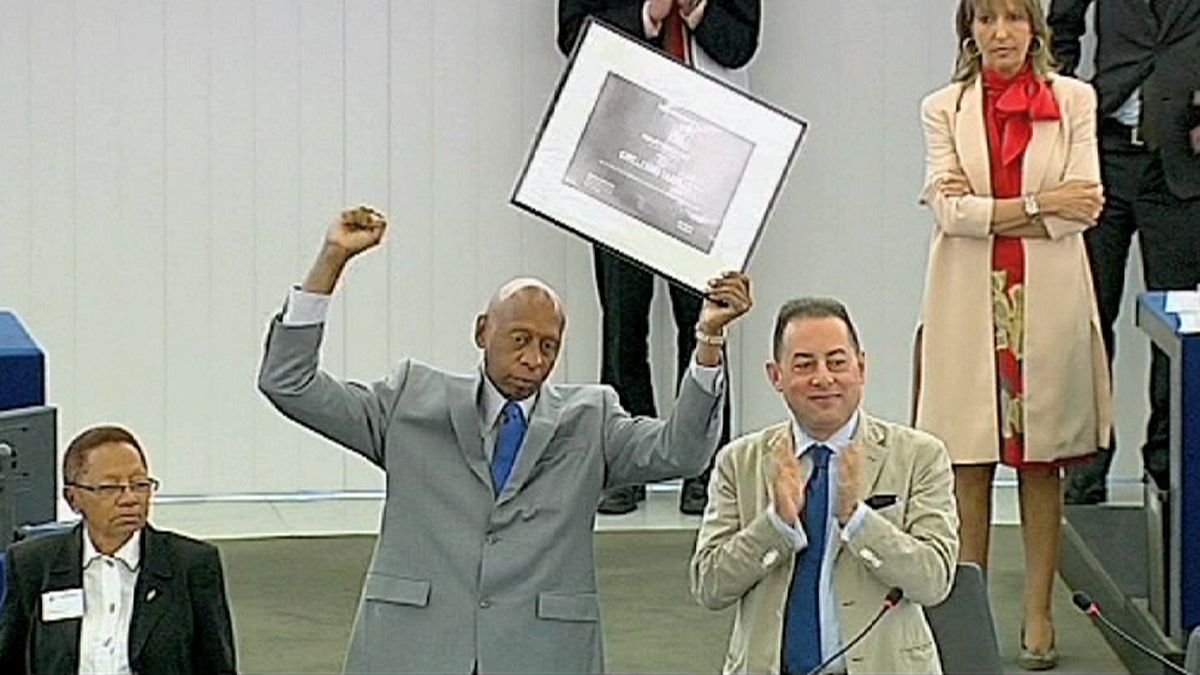Cuban dissident Guillermo Fariñas has finally picked up the Sakharov prize that he won in 2010.
Cuban authorities denied the journalist an exit visa three years ago when he has named as the winner of the award by the European Parliament.
Giovanni Pittella, an MEP and European Parliament Vice-President, praised Fariñas’ “fight for freedom.”
“On many occasions you chose a hunger strike as a weapon to protest against the dictatorship in your country. Your tenaciousness almost cost you your life, but at the same time have forced the Cuban government to accept the release of 52 political prisoners,” he said.
Fariñas has conducted 23 hunger strikes over the years to protest against the Cuban regime. He has repeatedly vowed that he is ready to die in his fight for greater individual freedoms in Cuba.
His award, named after Soviet dissident Andrei Sakharov, has been handed out by the parliament since 1988. South Africa‘s Nelson Mandela was its first winner.
Euronews spoke with Guillermo Farinas in Strasbourg, shortly before he picked up his prize from MEPs.
Sara Blanco, euronews: Some months ago the Ladies in White came to receive the Sakharov Prize 2005, now you’ve picked up the 2010 award. Something has changed in Cuba so you could come, there has been a migratory reform. But, the change, can it be felt in Cuba?
Guillermo Fariñas: Something has changed, but nothing really changes. The laws remain intact, the repression remains intact, and the amount of political prisoners in Cuba remains intact. And mainly the beatings in the streets of Cuba for making non violent actions remain intact. This so-called kindness from the Cuban regime, first of all, we have to say that are our rights, that have been violated during 54 years. Cuba is feigning only cosmetic changes, to obtain money for its economically bankrupt regime and lessen the impact of the US embargo and European sanctions.
But it also wants to obtain investments inside Cuba, because with the large numbers of unemployed, as you see here in Europe or Spain, at any moment now we could see a social uprising.
euronews: You’ve been on hunger strike many times, why do you choose this way of protesting?
Guillermo Fariñas: When I studied ways of facing up to the regime, a method that had good results historically with other Cuban prisoners was hunger strikes, mainly during the 1960s and 1970s. They put the repressive Cuban authorities really in a very tight corner. I took the task of taking the tactic of hunger strikes out of prisons and bringing it into a civilian environment. I think I achieved it because they became more frequent amongst the domestic Cuban opposition, that way of protesting against the injustices of the Cuban regime.
euronews: Will you do more hunger strikes.
Guillermo Fariñas: That depends on the circumstances that the Cuban regime puts me in and the circumstances that the Cuban regime puts Cuba in. The hunger strikes, I don’t do them for myself, but for other people.
euronews: Your first destination was Florida, now you are here in Strasbourg, and you’ll go to Madrid. You know there is always a lot of controversy about who finances the Cuban opposition. For example, who is paying for this tour.
Guillermo Fariñas: In this case the trip is paid by the European Parliament. But the trips I’ve made to Honduras, Miami, New York, New Yersey, Puerto Rico, Polond. These have been financed by two Cubans who live abroad and who enjoy economic prosperity, but who haven’t forgot that Cuba, their homeland, is still in a situation of non democracy of autocracy.
euronews: How do you see the future of your country.
Guillermo Fariñas: The future of our country looks very difficult. Because the Cuban government is trying to keep the Castro policies alive even if the brothers Raul and Fidel Castro disappear. This will lead to a confrontation with the citizens, and if we know how to be intelligent, it is going to be a confrontation in which we will become a real democracy, and we will win it mainly without bloodshed.
